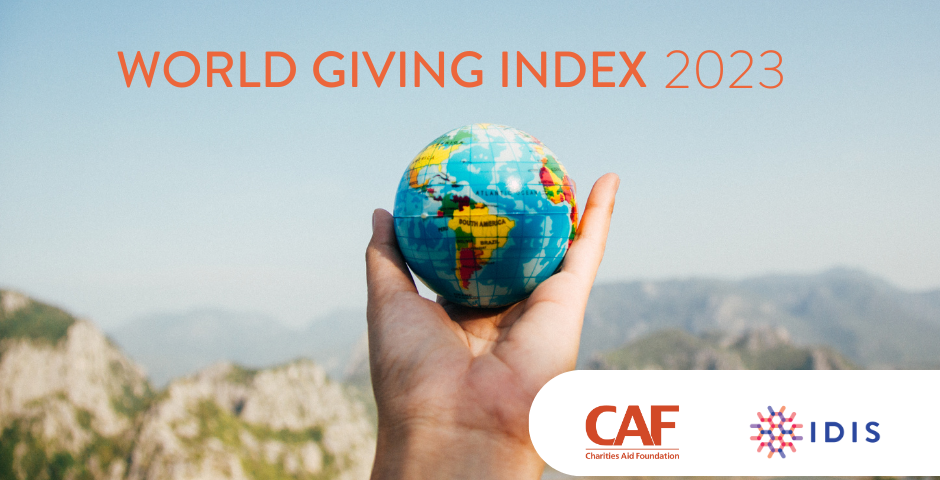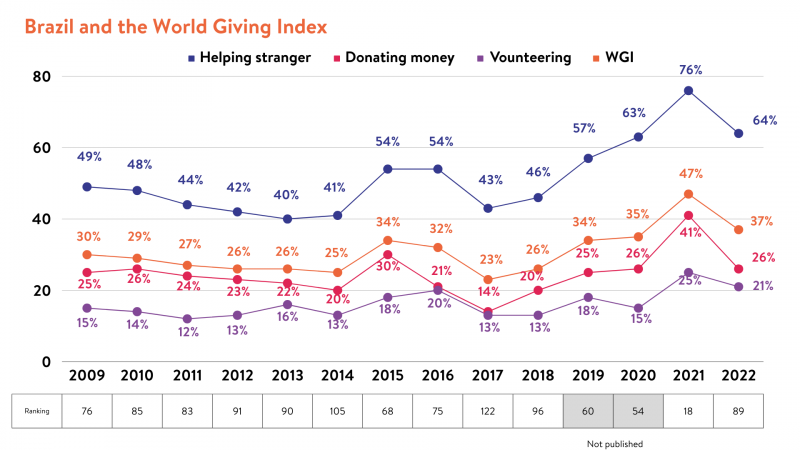Around the world, 4.2 billion people helped someone they didn’t know, volunteered time or donated money to a good cause according to the Charities Aid Foundation’s World Giving Index 2023.
For the sixth year in a row, the world’s most generous country is Indonesia. The second most generous country in the world is Ukraine, which is also the Index’s biggest riser this year, increasing its score after ranking tenth last year. Only three of the top 10 countries are among the world’s largest economies (Indonesia, United States, and Canada), while one of the poorest and least developed countries in the world – Liberia – is ranked in fourth highest place.

The CAF World Giving Index is one of the biggest surveys on giving ever produced, with millions of people interviewed around the world since 2009. This year’s Index includes data from 142 countries where people were asked three questions: have they helped a stranger, given money or volunteered for a good cause over the past month. As CAF official partner at Brazil, IDIS – Institute for the Development of Social Investment is promoting and analysing the national data.

After being among the 20 most generous nations in the ranking, Brazil fell to position 89. There was a drop in all indicators, the most pronounced being donations to NGOs, which went from 41% to 26%. Helping strangers was practiced by 64% of respondents in 2022, also less than the 76% found on the previous year. Volunteering fell from 25% in 2021 to 21%. The average score stood at 37%. Although Brazil had better positions in the ranking in previous years, this was the country’s second highest score since the index’s launch in 2009.
According to Paula Fabiani, CEO of IDIS, “The previous edition still reflected the impacts of the pandemic, when generosity was on the rise and the forms of participation, whether through donations or volunteering, were more evident. The drop in the coverage of these issues in the media, added to the impoverishment of the population and the climate of uncertainty and distrust common in election periods, contributed to a decrease in the population’s participation in the practice of donation”.
Fabiani considers that in the period there were also important movements in other countries, especially regarding the increase in donations, which led them to gain better positions.
New data available this year shows the factors that influence generosity around the world:
- People who have a strong religious belief have a higher overall giving index score, except for Europe where it makes no difference.
- People who rated their life in positive terms were more likely to have made a gift to charity, with some of the happiest countries in the world ranking in the top 10 for donating money (Sweden, Denmark, Netherlands, and Iceland).
- Immigrants are more likely to give than nationals, particularly in Europe, the Middle East and North Africa. Those who say they were born in another country tend to have a higher index score than nationals on average in most regions.
Neil Heslop OBE, Chief Executive of the Charities Aid Foundation, said:
“The CAF World Giving Index gives us reasons for hopeful optimism at a time of great instability. Generosity is innate to human behaviour and binds us all together as a global community. The diversity of countries leading the index highlights this: they cover the spectrum of wealth and economic development, geography, language, religion and culture. Giving is about building a connection with those around us, whether they are across the street or on the other side of the world. That is why we are calling on governments to do more to encourage those who can, to give the money and time that fosters vibrant, resilient civil society organisations as they face into social and environmental challenges and the impact of conflict and population displacement.”
Top 10 countries in the CAF World Giving Index 2023
- Indonesia
- Ukraine
- Kenya
- Liberia
- United States of America
- Myanmar
- Kuwait
- Canada
- Nigeria
- New Zealand
- Brazil
DOWNLOAD THE PUBLICATION
Notes to Editors
- For more information, please email media@cafonline.org
- The CAF World Giving Index is based on data from Gallup’s World View World Poll, which is an ongoing research project carried out in more than 100 countries. For detailed information on the World Poll methodology: http://www.gallup.com/poll/105226/world-poll-methodology.aspx


